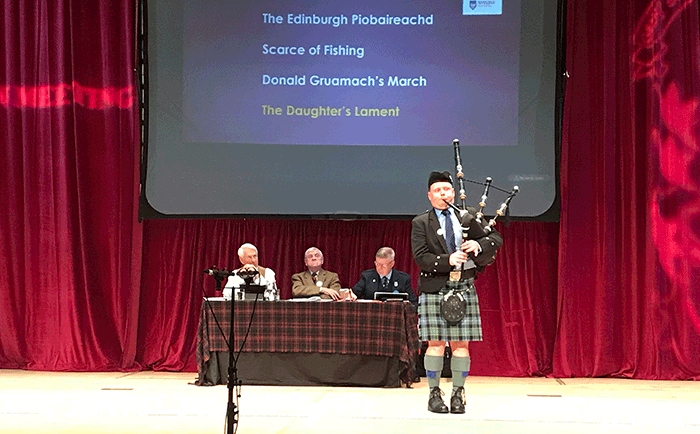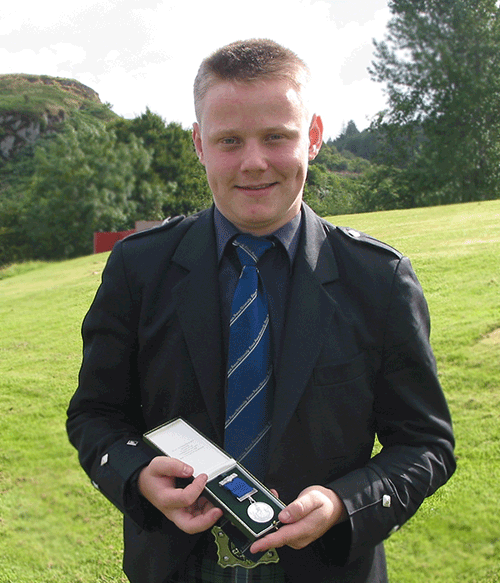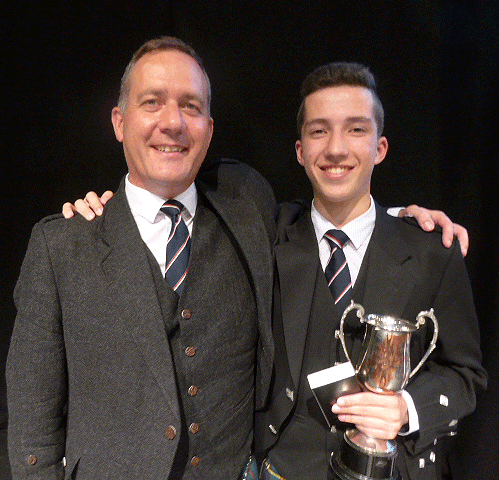
Callum Beaumont may be £1,000 better off this morning but those of us who heard his performance yesterday are richer by far. It may well be the best piobaireachd I have ever heard, if not, it is right up there. I refer to my notes: ‘No one will beat this; beautiful from start to finish; perfect pipe, subtlety, exemplary control’. Callum is pictured above on his way to glory before judges Malcolm McRae, Iain MacFadyen and Ian Duncan. They had to make the easiest decision of their lives.
Here we had the coming together of consummate fingering, an immaculate pipe and a natural musical sense, an innate appreciation of subtlety of phrase and nuance that one is born with; it cannot be taught.

By Robert Wallace
The tune chosen for him was the difficult Daughter’s Lament, a soaring piece of ceol mor with all the testing octave leaps from low G to high and the attendant technical pitfalls of chedari and embari. If it is broadcast by the BBC tonight or next week do not miss it. You will not get the enchantment, that sense of contact with something truly great that the audience in the Eden Court Theatre experienced, but you will hear the piobaireachd art in all its finesse played by a young master.
Callum; is he yet 30? He burst onto the big stage when he easily won the 2012 Clasp with Craigellachie even with a minor, inconsequential blemish. I was on the bench when he repeated that success in 2015. He was at it again last year and now this victory brings his haul to four. At this rate he may well surpass Donald MacPherson’s nine but really, who cares? This is not sport; it is high art. I can offer no further praise to Callum other than to say that his tune is locked in the memory for all time; he now resides with the greats.

Yet the 2019 Clasp competition was not just about the boy from Bo’ness. The first tune of the day for me was from another master Angus MacColl. I genuinely did not think his Donald Gruamach would be beaten – certainly not for rich harmony of pipe, fingering which blended with and enhanced the melody with precise measure, and brilliant juxtaposing of phrase upon phrase. Eighteen minutes? It flew past and even with a minor finger trip and a scare when a drop of water disturbed a drone for an instant, Angus, at 9am on a wet northern morning, lifted the heart.
[wds id=”2″]
Could things get any better? Well we had Stuart Liddell on soon after. Fresh from winning the Former Winners’ MSR the confidence was clear – but after five minutes he still hadn’t quite got the pipe 100%. Half way into Donald Gruamach it got there but we needed it through the ground and first variation to fully appreciate this master’s voice. By the end things were trilling along sweetly. A cert for a place. My notes: ‘Wonderful expression and control; all Gold and Silver Medal players should be in to hear these players.’
There was nothing but 100% on the pipe from Finlay Johnston. Like Stuart another of the horizontal droners, his tune was also D Gruamach. Did this make for boring listening? No, because like scenery changing with the weather, piobaireachd alters with varying interpretation and quality of pipe. Finlay’s had real pathos about it. It seemed to sit well with his tune, especially if we recall Donald MacDonald’s title ‘Donald Gruamach of Slate’s Lament for the death of his Elder Brother’. Could he have phrased it up a bit? I think so, but a lovely performance nevertheless.
Jack Lee took to the stage near the end. He was asked to play the Donald MacLeod composition Lament for John MacDonald, Inverness, a long but highly melodic tune. The pipe was so much better than at Oban. I don’t know what Jack did inside a week but by some wizardry he brought it to its peak in time for Inverness. It allowed him to set off on his long musical journey with renewed confidence; it allowed him to settle into the extensive taorluath and crunluath variations caring only for the need to keep the melodic thread going within the intricacies of the movements. He did so with some aplomb and left the platform to considerable applause.
However this marvellous contest was not just about the prizewinners. Of those I heard there were only two which fell well below what you would expect at this level. I was enamoured of Alan Bevan’s Fingerlock; what a bagpipe! It allowed the tension and release aspect of this interesting tune to be fully appreciated, the drone harmonics shifting from B to low A to low G with striking effect. Had Alan just spread out the urlar’s Bs and their grips the performance would have been complete.
Alasdair Henderson may have been a shade slow with Scarce of Fishing but he produced the best pipe I think I have heard from him and a very good pendulum variation to offset the over-sped connecting notes between the Var 1 edres and dares. Iain Speirs never really got the pulse going in Bells of Perth and (surprisingly) the pipe let him down; same tune for Bruce Gandy, the pipe steady but a little coarse after Callum, and he didn’t get the swing into the pivotal pendulum variation; Ian K MacDonald had a couple of sticky hiharins but navigated his way through the Edinburgh Piobaireachd with good control. I’m told the crunluath doubling can be played two ways, pointed or round. Well the round one, as played by Ian, did not sit well with me. Is this really piobaireachd? The rhythm suggests a hobby horse carousel rather than the land of MacCrimmon.

Glenn Brown’s pipe was nicely set but the D Ts & Cs were open and out of kilter with the others. At this level these things come into play. Glenn’s tune was also the Daughter’s Lament. Craig Sutherland looked like he was playing to feet rather than singing the song of the Lament for the Union; a couple of misses, pipe held well. Stuart Easton produced another excellent pipe but he seemed worn out and strained to me. He can console himself with a second in the NM Gold Medal and a prize in the Senior Piob at Oban. A few fingering issues blighted Greg Wilson’s Edinburgh Piobaireachd and again we had that weird finish. But the Wilson clan has a new champion to carry the torch onwards, young Campbell taking two firsts in the U18 events.
[wds id=”8″]





















Any talk of live streaming this event in the future?
I wouldn’t know Ross but I’m not sure it would be such a good idea. Oban and Inverness are such special events that everyone should make the effort to attend. Live-streaming could discourage that.
True. I made the trip once to go sit and listen to it all. Every piper should go at least once. Good bang for your buck too on the amount of performances you get to listen to. Very special places indeed.
Convenor should intro a simple system whereby listeners would not be subjected to the same MS&R tunes every year.
I am now kicking myself for being at Inverness for only the first day, having read of the Clasp competition. As indicated a radio broadcast of the performance will not capture the whole thing, but until the performance is on the radio I will not be able to concentrate on anything else—–the dog better not bark during the programme!